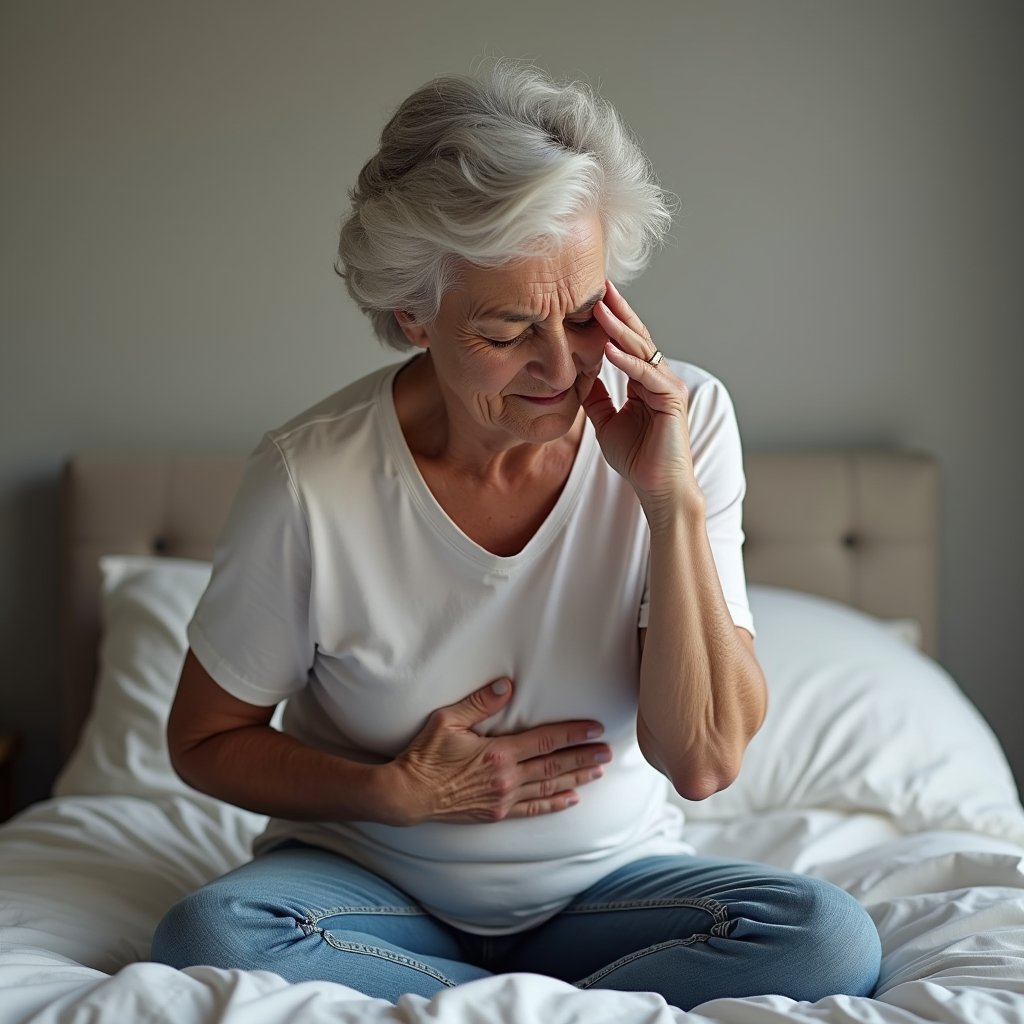Anxiety directly impacts your physical health by triggering your body’s fight-or-flight response, releasing stress hormones that affect multiple systems. You’ll experience increased heart rate, muscle tension, rapid breathing, and digestive disruptions as your sympathetic nervous system activates. Over time, chronic anxiety can weaken your immune function, raise cardiovascular risks, and contribute to inflammatory conditions. Understanding these physical manifestations helps you recognize and address anxiety’s effects before they escalate into serious health concerns.
Key Takeaways
- Anxiety triggers fight-or-flight responses, causing rapid heartbeat, muscle tension, and elevated blood pressure through sympathetic nervous system activation.
- Chronic anxiety disrupts digestive health, leading to nausea, stomach cramps, and changes in appetite due to stress hormone imbalances.
- Prolonged anxiety weakens immune function, making the body more susceptible to infections and slower to heal from injuries.
- Untreated anxiety increases risks of cardiovascular problems, digestive disorders, and chronic inflammation throughout the body.
- Anxiety interferes with sleep patterns, creating a cycle that further compromises physical health and immune system function.
The Science Behind Anxiety’s Physical Impact

When anxiety strikes, your body activates the sympathetic nervous system, triggering a cascade of physiological responses known as the “fight-or-flight” reaction. Your heart rate accelerates, muscles tense, and breathing becomes rapid as your body prepares to confront or escape perceived threats.
This response creates a neurotransmitter imbalance in your brain, releasing increased levels of cortisol and adrenaline. These stress hormones, while beneficial in short bursts, can damage your body when chronically heightened. You’ll experience increased blood pressure, compromised immune function, and disrupted digestive processes.
Your brain’s amygdala, responsible for processing emotions, becomes hyperactive during anxiety episodes. This heightened state affects your hypothalamus and pituitary gland, perpetuating the cycle of physical symptoms through continued hormone release and nervous system activation.
Common Physical Symptoms of Anxiety

These physiological changes from anxiety manifest in numerous identifiable symptoms throughout your body. When your brain perceives emotional triggers, it activates stress responses that create distinct physical reactions. You’ll notice immediate changes as your body shifts into a heightened state of arousal.
- Cardiovascular symptoms emerge initially, including rapid heartbeat, chest tightness, and raised blood pressure, as your body prepares for perceived threats
- Digestive system disruptions follow, causing nausea, stomach cramps, and changes in appetite as blood flow diverts to critical organs
- Musculoskeletal impacts become evident through muscle tension, particularly in your neck, shoulders, and jaw, while trembling or shaking may occur in your extremities
Understanding these physical manifestations helps you recognize anxiety’s onset and implement appropriate coping strategies sooner.
Effects on the Cardiovascular System

Since anxiety triggers an immediate fight-or-flight response, your cardiovascular system undergoes significant physiological changes that can strain heart function over time.
When you’re anxious, your heart rate accelerates and your blood pressure rises as your body prepares for perceived threats. Your blood vessels constrict to direct more blood to essential organs, while stress hormones like cortisol and adrenaline flood your system. These immediate responses, though natural, can lead to long-term cardiovascular issues if they occur frequently.
Chronic anxiety may contribute to persistent high blood pressure, irregular heart rhythms, and increased risk of heart disease. You’ll notice your heart pounding in your chest, and you might experience chest tightness or palpitations. These symptoms can create a cycle where cardiovascular changes intensify your anxiety, further straining your heart.
Impact on Digestive Health and Metabolism
Anxiety’s effects extend far beyond the heart, greatly impacting your digestive system and metabolic processes. When you’re anxious, heightened stress hormones disrupt your gut health, leading to different gastrointestinal issues and metabolic changes. Your body’s fight-or-flight response can slow digestion, alter nutrient absorption, and affect your metabolism’s efficiency.
- Chronic anxiety triggers excess stomach acid production, potentially causing acid reflux, ulcers, and inflammation of your digestive tract
- Stress hormones like cortisol can increase blood sugar levels, affecting your metabolic rate and potentially contributing to weight fluctuations
- Your gut-brain connection becomes disrupted, leading to changes in appetite, nausea, and irregular bowel movements
These digestive disturbances can create a cycle where physical symptoms intensify your anxiety, further compromising your gut health and metabolic balance.
Muscle Tension and Chronic Pain Connection
When experiencing prolonged anxiety, your body maintains a state of constant muscular readiness that can develop into persistent physical pain. Your muscles remain contracted for extended periods, leading to stiffness, soreness, and potential long-term musculoskeletal issues, particularly in your neck, shoulders, and back.
This sustained tension creates a cycle where anxiety increases muscle tightness, which then amplifies your pain and stress levels. You’ll find that incorporating muscle relaxation techniques, such as progressive muscle relaxation or targeted stretching, can help interrupt this pattern. When combined with chronic pain management strategies, including mindful breathing and regular physical activity, you can reduce the impact of anxiety-induced muscle tension. It is crucial to address both the psychological and physical components to effectively manage this anxiety-pain connection.
Sleep Disruption and Its Health Consequences
The persistent state of heightened alertness from anxiety doesn’t just affect your muscles – it greatly impacts your sleep patterns. When your mind processes anxiety triggers throughout the day, you’ll likely experience difficulty falling asleep and maintaining consistent sleep quality. This disruption to your natural sleep cycle can create a harmful feedback loop where poor sleep intensifies your anxiety symptoms.
- Your body’s stress response system remains activated during sleep, leading to frequent awakening and reduced time in restorative deep sleep phases
- Chronic sleep deprivation weakens your immune system, impairs cognitive function, and increases risk of cardiovascular issues
- Poor sleep quality affects hormone regulation, particularly cortisol and melatonin, which can worsen existing anxiety symptoms and create new health challenges
The relationship between anxiety and sleep disruption requires attention to break this cycle and protect your general health.
Immune System Response to Chronic Anxiety
Because chronic anxiety triggers a sustained stress response, your immune system experiences considerable alterations in its ability to defend against illness and infection. Your body’s immune response becomes compromised, leading to increased susceptibility to viruses and bacteria.
| System Impact | Short-term Effects | Long-term Consequences |
|---|---|---|
| White Blood Cells | Raised counts | Reduced effectiveness |
| Inflammation | Acute response | Chronic inflammation |
| Cortisol Levels | Initial spike | Sustained rise |
| Recovery Time | Slightly extended | Considerably delayed |
You’ll notice decreased resistance to common illnesses as your body diverts resources to maintain its heightened state of alertness. This chronic inflammation can contribute to autoimmune disorders, cardiovascular problems, and persistent digestive issues. When you’re experiencing prolonged anxiety, your immune system’s ability to distinguish between genuine threats and false alarms becomes impaired, potentially leading to inappropriate inflammatory responses throughout your body.
Long-term Health Risks of Untreated Anxiety
Left untreated, chronic anxiety manifests into serious long-term medical conditions that extend far beyond its immediate psychological impact. When you don’t address anxiety disorders properly, you’re putting yourself at risk for developing severe physical health complications. Research shows that persistent mental health challenges can accelerate the deterioration of your body’s essential systems.
- Cardiovascular complications, including increased risk of heart disease, high blood pressure, and irregular heart rhythms that can lead to heart attacks or strokes
- Digestive system disorders such as irritable bowel syndrome (IBS), acid reflux, and chronic stomach pain that may result in long-term gastrointestinal damage
- Weakened immune function leading to frequent infections, delayed wound healing, and increased susceptibility to autoimmune conditions that can permanently impact your quality of life
Natural Ways to Manage Anxiety’s Physical Effects
While managing anxiety through medication and therapy remains essential, incorporating natural remedies can greatly reduce its physical manifestations. You’ll find that mindfulness practices like deep breathing, meditation, and progressive muscle relaxation can lower your heart rate and blood pressure while decreasing muscle tension. Regular exercise releases endorphins that combat stress hormones and improves sleep quality.
Certain herbal remedies, such as chamomile, lavender, and passionflower, may help ease anxiety’s physical symptoms when consumed as teas or essential oils. You can also modify your diet by reducing caffeine and alcohol intake while increasing omega-3 rich foods. Getting adequate sleep, maintaining a consistent schedule, and practicing good sleep hygiene will strengthen your body’s natural ability to manage anxiety’s physical effects.
Frequently Asked Questions
Can Anxiety Cause Permanent Damage to the Brain if Left Untreated?
While untreated anxiety won’t cause permanent, irreversible brain damage, chronic stress can lead to significant neuroplasticity effects. You’ll experience changes in brain regions controlling emotions and memory, particularly in the amygdala and hippocampus. However, your brain’s adaptable nature means these changes can often be reversed with proper treatment. Don’t wait too long, though – early intervention helps prevent the accumulation of stress-related alterations in your brain’s structure and function.
Is Childhood Anxiety More Likely to Cause Physical Symptoms Than Adult Anxiety?
While both children and adults experience physical symptoms of anxiety, you’ll find that children often show more pronounced physical manifestations. This occurs because children haven’t yet developed sophisticated coping mechanisms and may struggle to verbalize their emotions. Instead, their anxiety triggers frequently manifest through stomachaches, headaches, and sleep disturbances. Early childhood experiences with anxiety can also establish patterns of physical responses that persist into adulthood.
Do Different Types of Anxiety Disorders Cause Different Physical Symptoms?
Yes, you’ll notice distinct physical symptoms across different anxiety disorders. With social anxiety, you might experience blushing, sweating, and trembling in social situations. Panic disorder often causes chest pain, rapid heartbeat, and shortness of breath during attacks. If you have generalized anxiety, you’ll typically face muscle tension, fatigue, and sleep problems. Specific phobias can trigger immediate reactions like dizziness and nausea when you encounter the feared object or situation.
Can Anxiety-Related Physical Symptoms Occur Even When Not Feeling Mentally Anxious?
Yes, you can experience physical symptoms of anxiety even when you don’t feel mentally anxious. Your body may react to anxiety triggers before your conscious mind recognizes them, resulting in psychosomatic symptoms like muscle tension, rapid heartbeat, or digestive issues. This disconnect occurs because your autonomic nervous system responds to perceived threats automatically, and it’s possible for your body to be in a stress response while your mind feels relatively calm.
Are Certain Professions or Lifestyles More Prone to Anxiety-Induced Physical Health Problems?
You’ll find that high stress occupations like emergency responders, healthcare workers, and financial traders are particularly susceptible to anxiety-induced physical symptoms. Your lifestyle choices, including irregular work schedules, frequent travel, or high-pressure deadlines, can amplify these effects. If you’re in management positions or self-employed roles, you’re more likely to experience chronic stress manifestations like cardiovascular issues, digestive problems, and immune system dysfunction.





